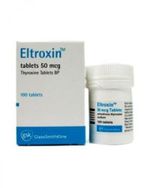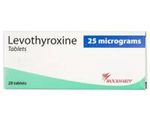The thyroid is a small gland in the neck that secretes hormones. The most common problems affecting it are overactivity (hyperthyroidism) or underactivity (hypothyroidism). These can cause symptoms such as lethargy and weight loss.

Thyroid problems
Treatments
- All treatments
- Prescription medicines
- Non-prescription medicines
- Relevance
- Name A-Z
- Name Z-A
- Price low-high
- Price high-low
How does Dokteronline work?
At Dokteronline, you can get expert advice from doctors quickly, without the hassle of visiting your GP’s surgery. Take care of your health with reliable treatments and information from the comfort of your home.
Select your preferred treatment
The doctor will review your medical request
The pharmacy will ensure your medication is delivered to your doorstep
What is the thyroid?
The thyroid is a butterfly-shaped gland located in the neck, close to the windpipe. It produces thyroid hormones, which are important for our metabolism and growth. In order to do this, the gland needs iodine. That is therefore an essential part of our diet, which we obtain in the form of iodised salt in foods like bread, fish and eggs. Once in our blood, iodine is transported to the thyroid where it is filtered out and used in the production of hormones.
The thyroid hormones play a major role in the metabolism of all our cells – that is, the process of absorbing food and converting it into the energy essential for our entire body to function properly. So the thyroid is a very important organ.
It is quite common for the thyroid gland to be underactive (not produce enough hormones) or overactive (produce too many). These conditions are called hypothyroidism and hyperthyroidism, respectively. The former is far more prevalent in women than in men, and the risk of developing it increases with age.
How to recognise thyroid problems
Symptoms of hypothyroidism (underactivity) include…
- Weight gain.
- Lethargy and fatigue.
- A low heart rate.
- Feeling cold easily and often.
- Constipation.
- Hair loss.
- Swollen eyelids and face.
- A swollen thyroid.
- Changes to the voice.
- Dry and pale skin.
- Irregular periods.
- Difficulty concentrating.
- Psychological complaints.
- Muscle pain.
There are so many symptoms because the hormones produced by the thyroid end up in the blood and therefore affect the whole body. In some cases the condition is not easily recognised, especially when the symptoms are not so obvious.
Symptoms of hyperthyroidism (overactivity) include…
- Sweating.
- Fatigue.
- Palpitations.
- Anxiety.
- Weight loss.
- Diarrhoea.
- Tremors.
- Warm and moist skin.
- Enlarged and bulging eyes.
- A swollen thyroid.
- Irregular periods.
- Increased appetite.
- Insomnia.
What causes thyroid problems?
As explained above, we need to distinguish between an underactive and an overactive thyroid. The most common cause of the former, hypothyroidism, is an auto-immune disease. This prompts the body to generate antibodies against its own thyroid, so that it does not produce enough hormones. In most cases the underlying disorder is Hashimoto’s disease, which eventually causes the thyroid to stop working altogether. This disease is chronic and occurs mainly in women.
Other possible causes of hypothyroidism are thyroiditis (inflammation of the thyroid) after childbirth, an operation to the thyroid, radiotherapy in the neck area, use of medicines containing lithium or iodine or treatment with radioactive iodine. There is also a greater risk of developing a thyroid disease if it runs in the family and after giving birth. The usual cause of hyperthyroidism is another auto-immune disorder, Graves’ disease. But in this case the thyroid produces too many hormones. Hyperthyroidism may also be triggered by a goitre (a swelling of the thyroid that keeps growing), medication containing lithium or iodine, thyroiditis, a growth in the thyroid gland and other auto-immune diseases.
How can you prevent thyroid problems?
Since both hypothyroidism and hyperthyroidism are serious conditions requiring medication, there is relatively little you can do about them yourself. But contact your doctor if you are being treated for hypothyroidism and experience any of the following symptoms.
- Lethargy.
- Feeling cold easily.
- Swollen eyelids.
- Hair loss.
- Dry skin.
These are complaints that can be caused by a lack of thyroid hormones.
Likewise, contact your doctor if you experience any of these symptoms.
- Nervousness and anxiety.
- Chest pain.
- Headache.
- Sweating.
- Weight loss.
- Mood swings.
- Diarrhoea.
They may be caused by an excess of thyroid hormones.
Can I do anything myself?
Since both hypothyroidism and hyperthyroidism are serious conditions requiring medication, there is relatively little you can do about them yourself. However, it is important that women who want to become pregnant and have hyperthyroidism be treated for it first. Excessive levels of thyroid hormone in the blood can pose risks for the baby, such as retarded growth and skull abnormalities. Once the levels have returned to normal, it is safe to become pregnant. It is also important to eat a healthy and varied diet and to exercise regularly. This will make you feel fitter. People who smoke and suffer from hyperthyroidism also have a greater chance of experiencing bulging (or more bulging) eyes.
What treatments are available?
If you see your doctor because you think you have thyroid problems, he or she will first order a blood test to confirm that your thyroid gland is not working properly.
Two values are measured: free T4 (thyroid hormone) and TSH (thyroid-stimulating hormone). Normally, levels of free T4 are between 9.0 and 24.0 pmol/l. Normal TSH is between 0.4 and 4.0 mU per litre. With hypothyroidism, the amount of free T4 in the blood is lower than this and the amount of TSH higher. With hyperthyroidism, the opposite applies.
Artificial thyroid hormone
Hypothyroidism can be treated easily using an artificial thyroid hormone such as Levothyroxine. If the cause of this condition is Hashimoto’s disease, a thyroid operation or treatment with radioactive iodine, it is likely that you will need to take the tablets for the rest of your life. As a rule you should take one a day, always at the same time and on an empty stomach. If you are under 60 years of age and do not have any heart problems, a high dosage is usually prescribed from the outset. Otherwise, the initial dosage is low but stepped up from time to time. Because the strength of Levothyroxine can vary from brand to brand, and even from pack to pack, it is important that you always use the same brand in the same packaging.
Medication
Hyperthyroidism can be treated with medicines, radioactive iodine or surgery. Your doctor will help you decide which approach is most suitable for you. This will depend upon potential adverse side effects and your personal situation, such as wanting to have children. If medication is chosen, you will probably first be prescribed Thiamazole or Levothyroxine, two similar drugs that stop the thyroid gland working. Either may be used in combination with a beta blocker should you experience unpleasant side effects like palpitations and perspiration. After about six weeks your values will be checked and you will be given a medicine containing an artificial thyroid hormone, such as Levothyroxine. As a rule, you should take the tablets once a day, always at the same time and on an empty stomach. Your values will be checked again after another six weeks, and your dose may be changed.
Rather than this course of treatment, you can instead opt for so-called “titration”. In this case you are given a low dose of Thiamazole, administered by an internal medicine doctor. Because the strength of Levothyroxine can vary from brand to brand, and even from pack to pack, it is important that you always use the same brand in the same packaging.
Another option is treatment with radioactive iodine. In this case you have to drink a liquid containing the iodine at hospital. The advantage of this method is it reaches your thyroid quickly, where the radiation stops the gland working. It is also safe, because you discharge the radioactive substance in your urine. The disadvantage is that years later your thyroid may become underactive and so you will then have to take medication anyway. You also need to bear in mind that you must not become pregnant for six months after taking radioactive iodine.
Surgery
Finally, surgery can be used to treat hyperthyroidism. This involves removing a piece of the thyroid. The advantage is that this method eases the pressure on your windpipe, as well as reducing the swelling, but once again there is a risk that later your thyroid will become underactive and so you will have to take medication. There is also a risk of contracting permanent hoarseness if the nerve running through the thyroid is damaged during the operation.
With both hypothyroidism and hyperthyroidism, it can take several months to find the right dose of medication. If you have Graves’ disease, your blood is normally checked once every three months. Should you wish, you can also stop taking your medication for a while and then have your blood tested again at different intervals. Approximately half of patients who do this find that their thyroid eventually recovers and starts working properly again. But if the disease does return after quitting the medication, you will have to return to a drug-based treatment or opt for radioactive iodine or surgery.
Additional risks and side effects
The possible side effects of Thiamazole are nausea, joint pain and skin rashes. Another rare complication is too rapid a fall in the patient’s white blood cell count. Side effects of Levothyroxine include sweating, palpitations, chest pain and diarrhoea. In addition, other drugs you are taking can affect your thyroid medication. They may counteract or reinforce each other, possibly with harmful effects. You should therefore always inform your doctor if you are taking any other medicines.
As described above, the various treatments for hyperthyroidism all have their advantages and disadvantages. The main potential drawback is that the thyroid becomes underactive after a while, so that you still have to take artificial thyroid hormones.

